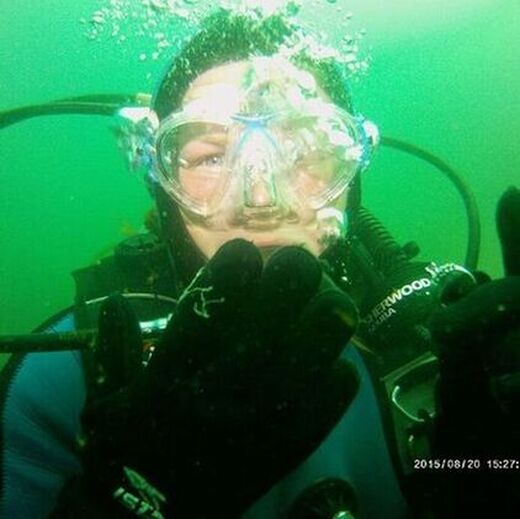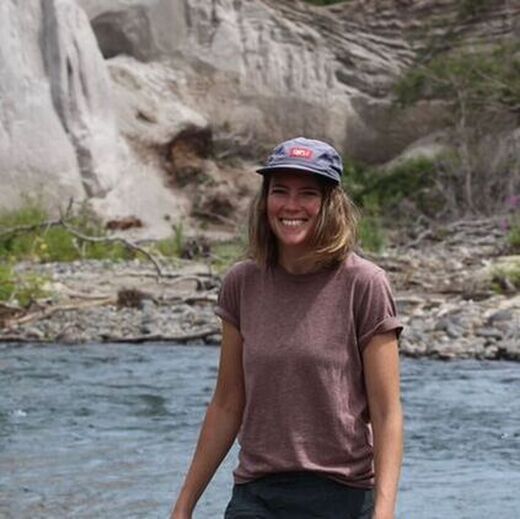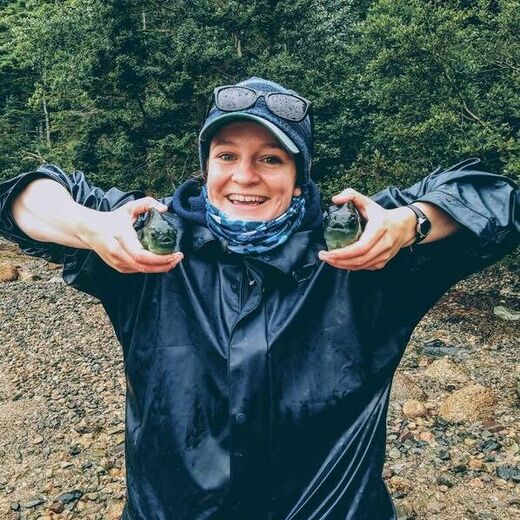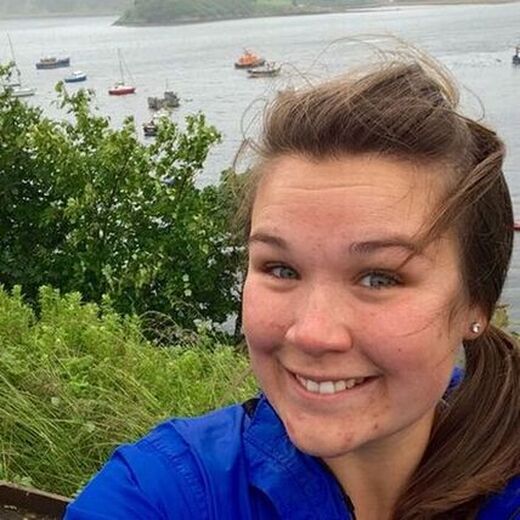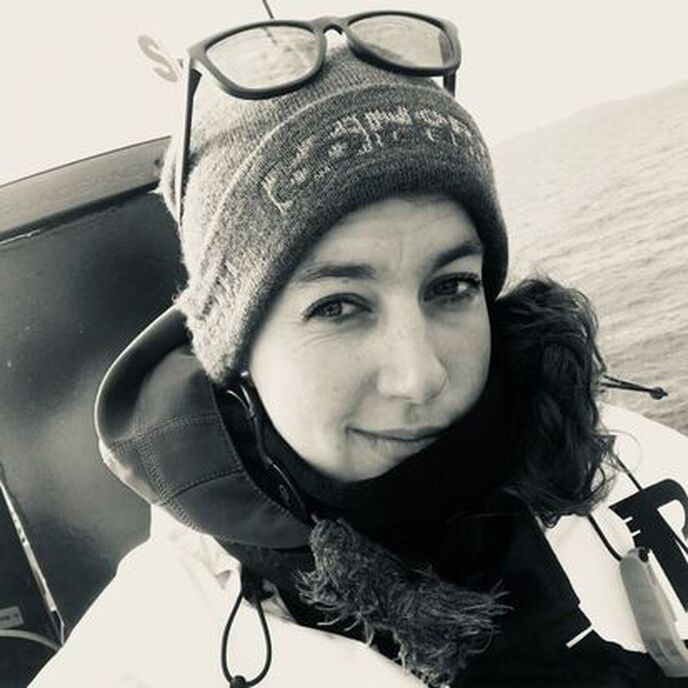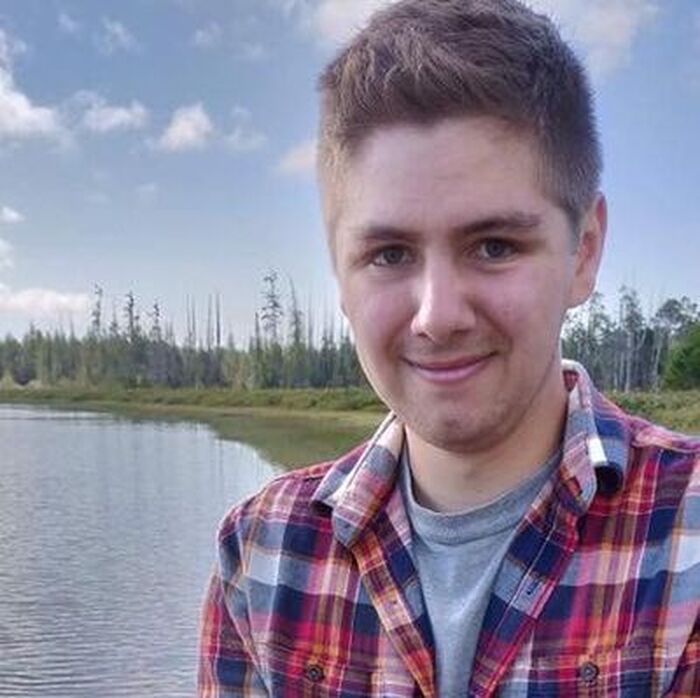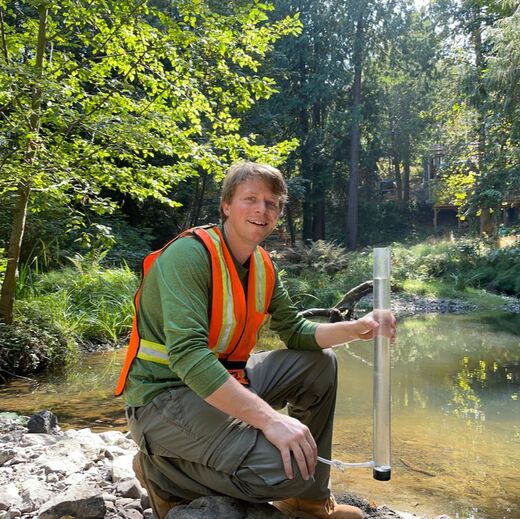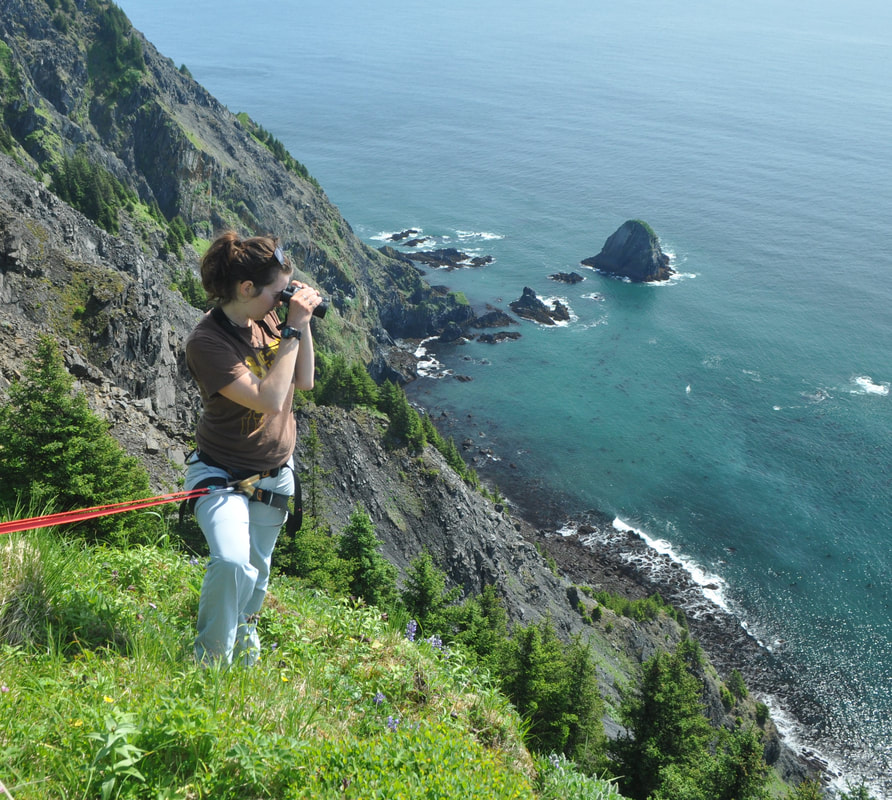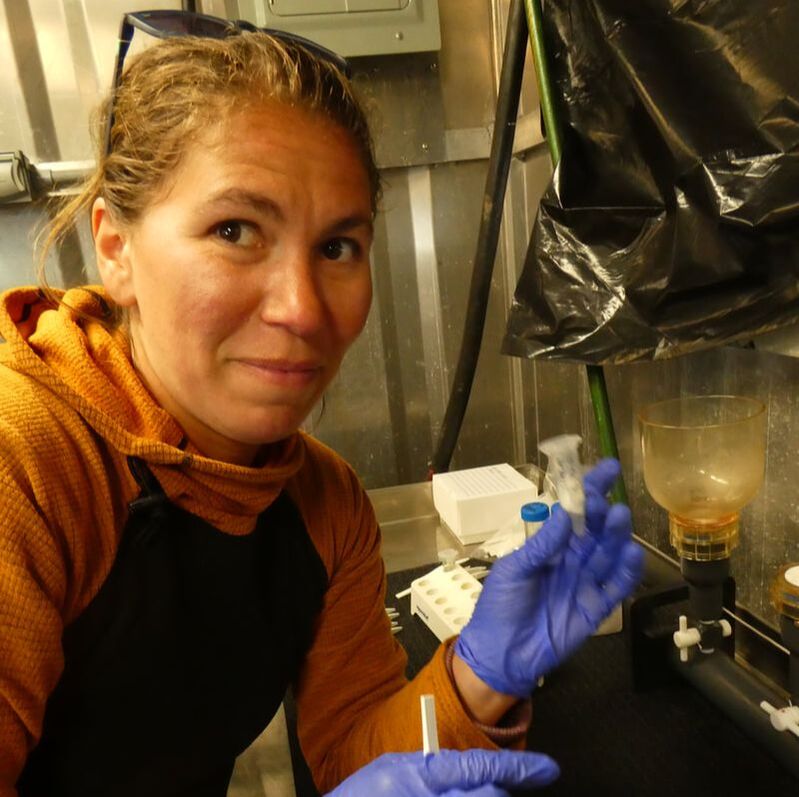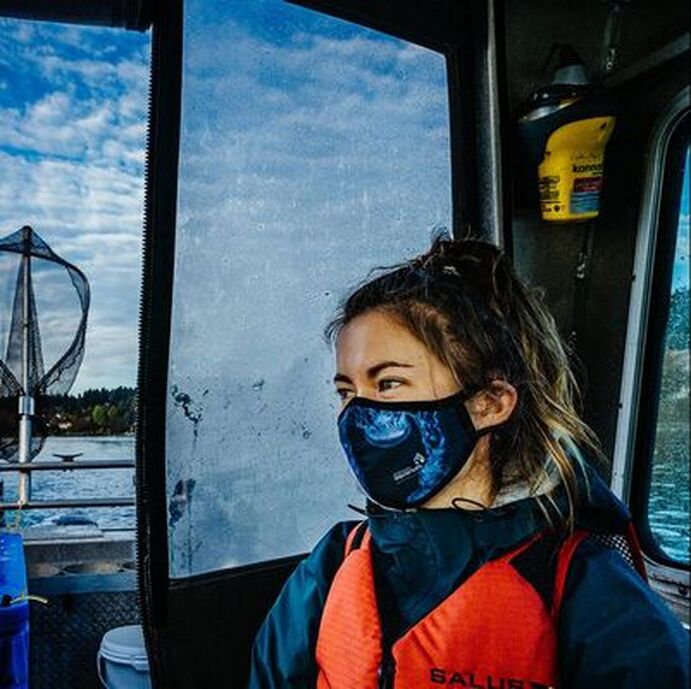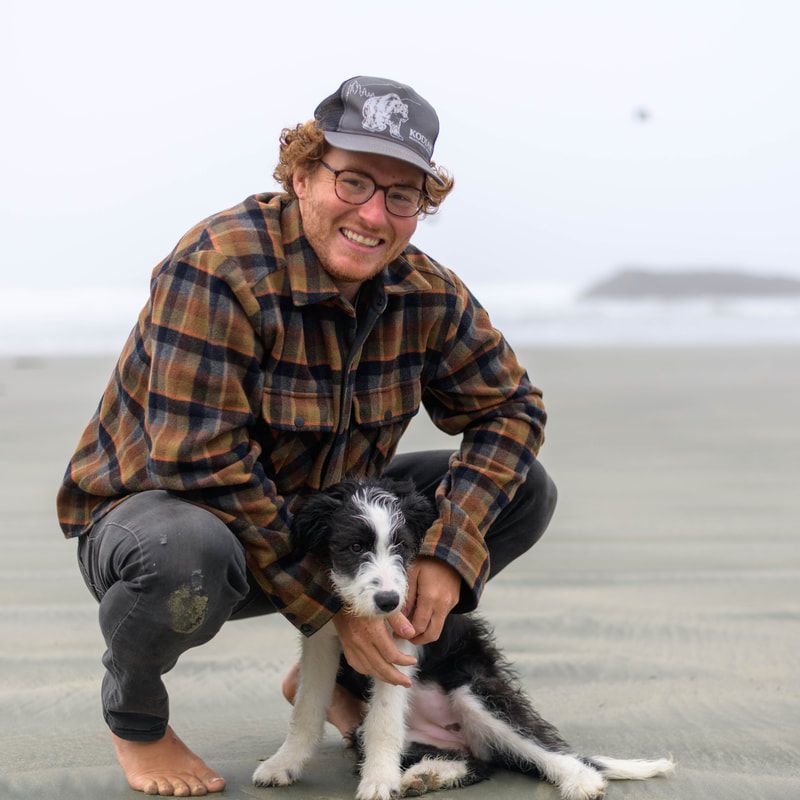Morgan BlackWith the support of the EIRP lab (VIU), the Juanes lab (UVIC), and the Hakai Institute, Morgan will be looking at the fish and mobile invertebrate communities found on clam gardens in several sites on the BC coast. She has a very broad range of interests from bats to benthos. Biodiversity and ecological interactions link many of her interests together, and coastal ecology allows her to be in her favorite place in the world... the ocean. See her website here.
|
Leigh GaffneyLeigh’s background is in animal welfare science and behaviour. She is particularly interested in questions that address how fish welfare, policy, and conservation efforts meet. Leigh’s project, part of CHONe 2, will investigate the impacts hatchery-rearing practices may have on Coho Salmon otolith development and how this influences the hearing abilities, behaviours, and survival of hatchery-reared salmon. Otoliths are essential components of the sensory organs that enable all teleost fish to hear and maintain balance, and are primarily composed of calcium carbonate. Previous research has shown that the otoliths of hatchery-reared salmon possess higher percentages of “abnormal” (an abnormal polymorph of calcium carbonate) or vateritic otoliths in comparison to wild salmon. These vateritic otoliths may reduce otolith function and cause hearing loss in salmon; potentially leading to negative fish welfare and reduced survival. However, little research has been done to investigate the effects of vateritic otoliths on fish or what environmental rearing practices might cause vateritic otoliths to form.
|
Darienne LancasterDarienne will be developing passive and active acoustic methods for assessing rockfish abundance, size, and habitat as well as investigating the impacts of vessel noise on rockfish behavior. Darienne is fascinated by all things rockfish and completed a Masters thesis in 2015 on recreational non-compliance in Rockfish Conservation Areas with Dr. Natalie Ban. Darienne has also worked for DFO in BC and Newfoundland and participated in SCUBA research projects all over the world. Darienne will be completing her PhD research as a collaboration between the Juanes Lab at the University of Victoria and Dr. Dana Haggarty’s group at the Department of Fisheries and Oceans.
|
Kelsie MurchyPacific salmon and Southern Resident killer whales are important species in southern British Columbia, and their decline has increased public awareness and research. My project is aimed to evaluate the impacts of shipping noise on Chinook salmon behaviour and physiology as these are the preferred prey of southern resident killer whales. Chinook salmon will also be exposed to southern resident killer whale vocalizations to determine their sensitivity and characterize any predator avoidance. I am also recording a variety of Pacific salmon in a semi-natural environment to evaluate the presence of vocalizations.
|
Annika HeimrichI am a former international Masters student at the Juanes Lab, and after working as a wildlife guide and marine mammal observer for the past two years in Iceland I am back on the team at UVic. I study underwater acoustics in the Western Canadian Arctic and examine the soundscape of various areas (i.e Kitikmeot region, Amundsen Gulf). A strong focus of my work lies on the evaluation of spatiotemporal distribution patterns of marine mammals and fish based on their vocal presence. Typical species vocally present in the Western Canadian Arctic are bowhead whales (Balaena mysticetus), beluga whales (Delphinapterus leucas), two pinniped species known as bearded seals (Erignathus barbatus) and ringed seals (Pusa hispida), as well as fish species such as Arctic cod (Boreogadus saida). Since most of the accessible regions for humans in the Western Canadian Arctic have few regulations in place to mitigate shipping noise, my work aims to also assess shipping noise in these areas.
|
Micah QuindazziMicah's research primarily focuses on the factors influencing the migratory behaviour of Chinook and Coho salmon and using new techniques in the field of otolith microchemistry (trace elements and stable isotopes). Otoliths are useful structures to study because they grow incrementally over the course of the salmon's life and are inert once incorporated. This allows Micah to identify the marine regions these salmon transited over the course of their lifetimes by comparing to baseline samples and a priori isoscape models. He also uses automated, 3D, μCT scanning to increase the throughput and quality of otolith morphometric data to answer a variety of ecological questions.
|
Braeden DonaldsonThe main driver of my research is the need to recover salmon populations in streams where salmon runs have been severely diminished or lost entirely. I seek to use predator-prey dynamics and life skills training as a means of improving the health and abundance of Coho salmon in southern Vancouver Island. I will be examining the effect of predators on the behavioural plasticity of hatchery-raised Coho and how in-hatchery predator exposure will translate to increasing their post-release survival.
|
Deborah (Debbie) SharpeDeborah, known to most as Debbie, is currently a PhD student in the Juanes Lab, working as a Mitacs Accelerate Fellow with researchers at Wildlife Conservation Society Canada to examine the spatio-temporal patterns of ringed seals – a culturally and ecologically important species in the Canadian arctic. As ice-free periods increase in both duration and extent throughout the arctic, vessel traffic is also increasing, changing the underwater soundscape that marine mammals live in. Like many of her labmates, Debbie’s work is particularly focused on evaluating how vessel noise may impact species like the ringed seal, and will involve the use of AIS vessel data and animal-borne telemetry devices. Check out her website.
|
Meredith PochardtMy research will focus on the use of environmental DNA (eDNA) as a tool for monitoring and modelling the distribution, abundance, and run timing of oolichan (Thaleichthys pacificus, or eulachon) populations within the central coast of British Columbia. I have experience using similar methods in coastal streams throughout Southeast Alaska and have worked to develop the Southeast Alaska Oolichan Tribal Monitoring Network to help monitor this culturally important species. My work will also link these ongoing oolichan projects along the Pacific Coast to better understand population dynamics.
|
Hailey DaviesHailey has experience conducting research on topics including marine biodiversity, shellfish aquaculture, microplastics, and soundscape ecology. She has been a part of the Juanes Lab as an undergraduate student and research assistant, and has become particularly interested in topics related to fish welfare. Hailey’s MSc project will investigate the effectiveness of descending devices at reducing barotrauma in BC inshore rockfishes. Due to their physiology, rockfishes suffer high mortality rates when released at the surface without recompression. Another aspect of Hailey’s project is studying how rockfish soundscapes may be affected by barotrauma events.
|
Mack BartlettMack is working with Ha’oom Fisheries society and the Pacific Salmon Foundation to implement a large-scale PIT tagging and fish health program focused on WCVI Chinook salmon, which are threatened by
local extinction. Mack will be trying to determine how Chinook survival is influenced by stressors during their early life at sea by pairing tagging and molecular genetic stressor and disease profile data. Prior to returning to school, Mack was developing highly collaborative juvenile salmon programs in Clayoquot and Barkley Sound with a recent focus on Chinook salmon rebuilding efforts. Aspects of this work have formed into the DFO led Follow the Fish program. When not working Mack can be found surfing, tinkering, fishing and exploring the West Coast. |
